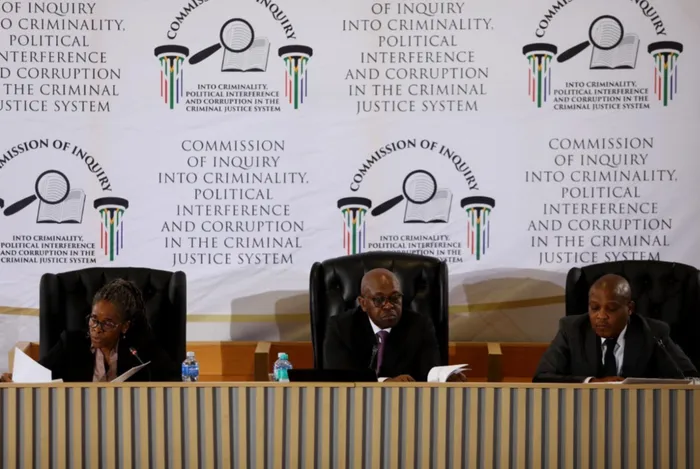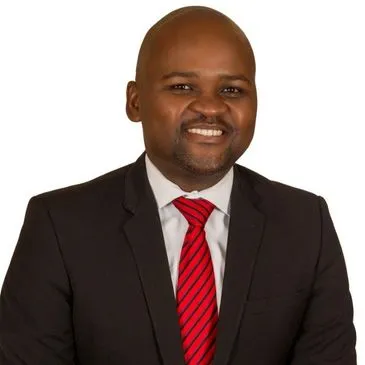
The Madlanga Commission of Inquiry.
Image: Oupa Mokoena / Independent Newspapers
The Madlanga Commission of Inquiry into alleged corruption within South Africa’s police service is more than an investigation into misconduct. It is a moment of reckoning for the country’s democratic values and a test of whether transparency can restore trust in institutions that have long struggled with credibility.
At its core, the inquiry exposes the fragility of South Africa’s law enforcement institutions and how far they have drifted from their constitutional duty. The Commission, led by Justice Mbuyiseli Madlanga, has captured national and international attention because of the seriousness of the allegations. The fact that a sitting Minister of Police and senior police generals are accused of colluding with criminal cartels to subvert justice strikes at the very heart of state integrity.
For ordinary South Africans, it raises painful questions about whether the police still serve the public or have become part of the problem. For global observers, it sends a troubling signal: if the custodians of the law are compromised, who can guarantee safety, stability, or fairness?
Transparency as a reputational asset
Paradoxically, the Commission also presents an opportunity. Few democracies, especially in the developing world, would so openly examine their own security failures. The willingness of a provincial police commissioner to testify as a whistleblower, at great personal risk, shows that South Africa still possesses the courage and institutional resilience to confront wrongdoing.
Transparency, when genuine, can be a powerful reputational strength. It demonstrates that South Africa’s democracy, despite its weaknesses, remains rooted in constitutional accountability. It sends a signal that the country’s institutions, though battered, still have the capacity for self-correction.
This openness stands in sharp contrast to the secrecy that often defines governance elsewhere. In that sense, the Commission itself is proof that the spirit of accountability is not lost. But transparency without consequence risks becoming theatre. If the inquiry’s revelations do not lead to visible reform, the exercise will deepen cynicism rather than restore faith.
The shadow over investor confidence
South Africa’s credibility among investors is already strained. The economy continues to wrestle with slow growth, high unemployment, and the lingering effects of state capture. But beyond economic fundamentals, reputation matters. The perception that law enforcement is compromised undermines the broader investment climate.
The Commission’s proceedings come at a time when South Africa is working to exit the Financial Action Task Force grey list, imposed in 2023 because of weaknesses in combating money laundering and terrorist financing. Allegations of deep-seated corruption within the police could reinforce the perception that the state still struggles to enforce the rule of law.
Investors and global partners may start asking hard questions. If corruption reaches the core of the justice system, can South Africa reliably protect contracts, borders, and intellectual property? Can it safeguard capital and ensure equal treatment before the law? These are not abstract concerns. For investors, trust in governance is as vital as tax incentives or mineral potential.
Trust at a crossroads
According to the 2025 Edelman Trust Barometer, South Africa is one of only two countries worldwide that recorded a significant rise in overall trust following recent elections. The establishment of the Government of National Unity, improved power stability, and renewed cooperation between business and government have contributed to a modest recovery in confidence. Trust in government rose by seven percentage points to 36 percent – a meaningful gain in a country long weary of corruption.
But this fragile optimism now faces its toughest test. Allegations that senior police leaders may have colluded with criminal syndicates could reverse these gains and deepen public grievance. The same Edelman report shows that 71 percent of South Africans already believe the system serves only a select few, and 77 percent worry about discrimination and prejudice in public institutions.
In this environment, even a perception that justice is selective can fracture what little trust remains. If citizens lose faith in the police, they lose faith in the state itself.
Global perception, local consequence
Reputation in a globalised economy is cumulative. Each headline linking “police” and “corruption” with “South Africa” chips away at the country’s credibility. Investors in mining, manufacturing, and renewable energy pay close attention to such signals because these sectors depend on stability and clear governance.
But reputation can also be rebuilt. The same Commission that exposes wrongdoing can, through its process and eventual outcomes, demonstrate that South Africa is serious about renewal. The country’s brand has always been defined by resilience – by its ability to recover from moments of moral and institutional crisis. That resilience is the essence of South Africa’s reputation equity. The challenge is to turn transparency into transformation. The Commission’s findings must not be filed away as another inquiry with no consequences. Civil society, business, and the media all have a role to play in ensuring accountability and reform.
Reputation as national capital
In a world where capital follows confidence, reputation is a form of national currency. Countries that uphold integrity attract investors who value predictability and ethics. Those that normalise impunity drive them away. The Madlanga Commission will determine more than the careers of the individuals involved. It will shape perceptions of whether South Africa’s democracy still has the moral courage to correct itself.
The country now stands at a reputational crossroads. Its institutions are being tested not only in the courts but also in the global arena. If South Africa can transform this moment of scrutiny into a demonstration of accountability and reform, it could emerge stronger – showing that transparency and justice remain its greatest competitive advantages. If not, the price will not only be measured in lost trust, but in lost investment, lost opportunity, and a diminished standing in the eyes of the world.

Tshepo Matseba is the Managing Director at Reputation 1st Group.
Image: Supplied
Tshepo Matseba is the Managing Director at Reputation 1st Group, Strategic Partner at Ebony+Ivory Integrated Communication Agency, and former President of the Public Relations Institute of Southern Africa (PRISA). He writes in his personal capacity.
*** The views expressed here do not necessarily represent those of Independent Media or IOL.
BUSINESS REPORT